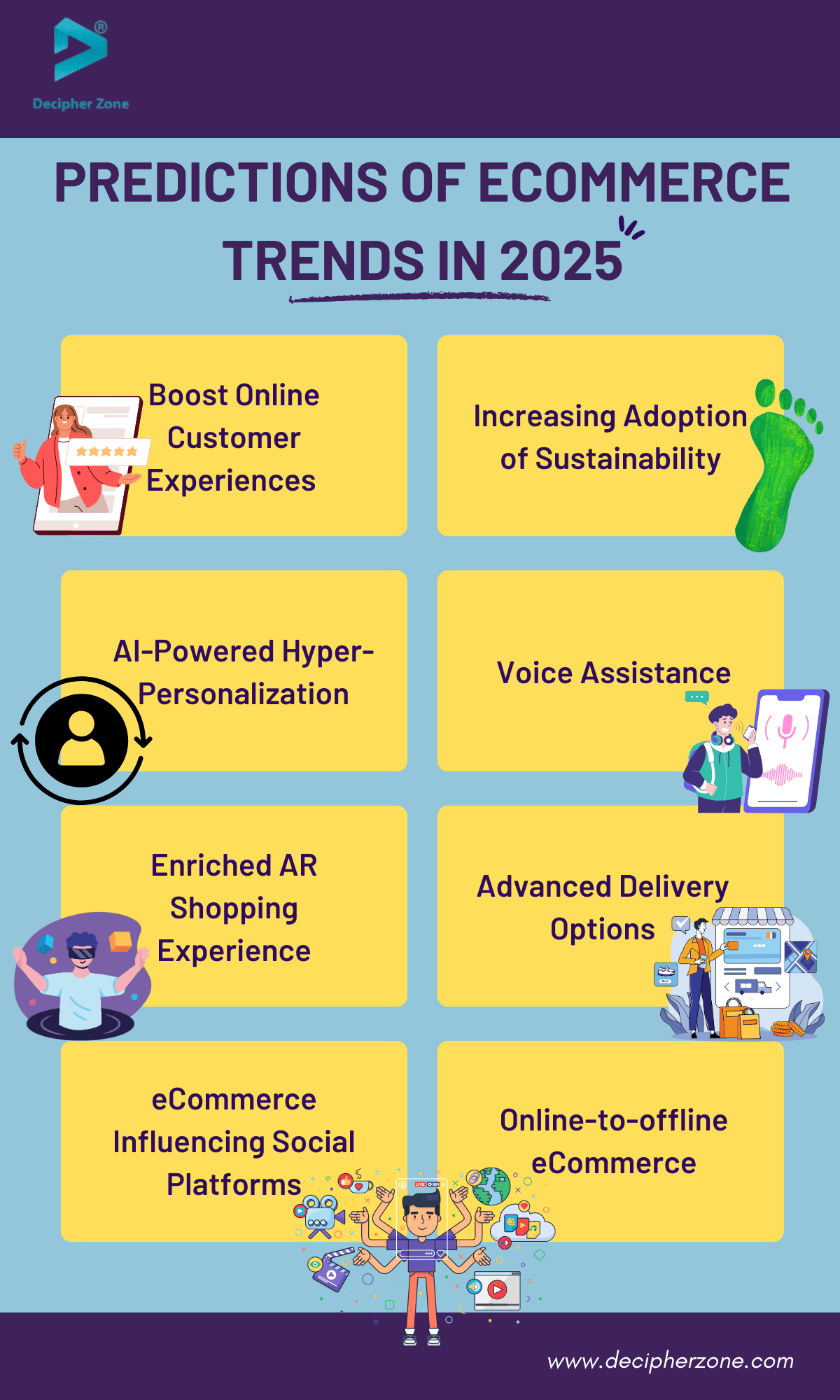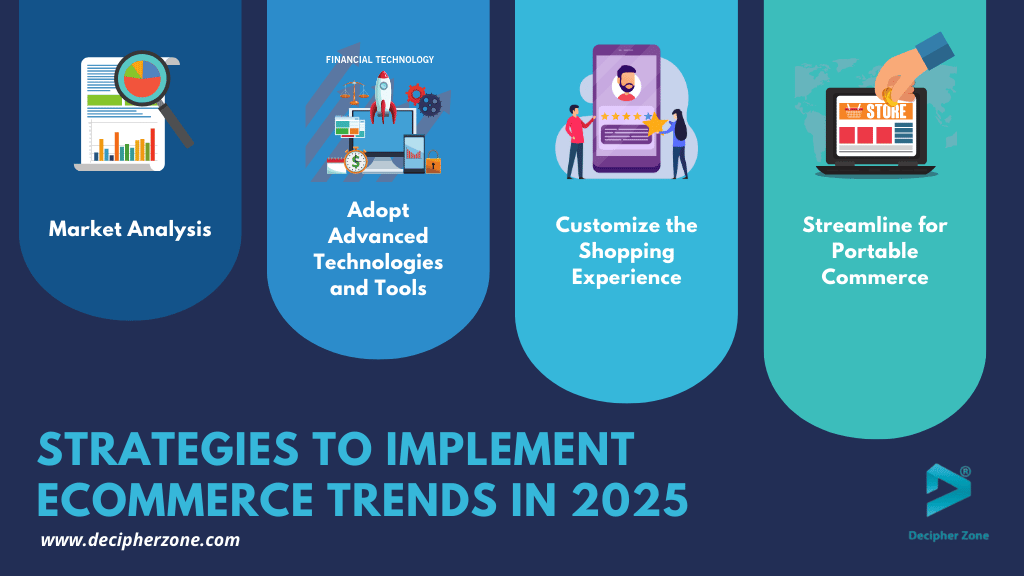Stay updated on eCommerce trends for 2025 to stay ahead in the industry. Now is the perfect time to invest in expanding or starting a new eCommerce business as new innovative ideas are on the horizon. Learn more about upcoming predictions, strategies, tools, and technologies to bring your vision to life.
It's critical for online merchants to not only remain ahead of the curve by implementing creative methods but also to keep up with evolving trends since the worldwide eCommerce industry is predicted to reach $10.17 trillion by 2025.
During the forecast period(2024-2029), the eCommerce market size is estimated at $8.80 trillion in 2024 and is estimated to cross 18.81 trillion by 2029, growing at a CAGR of 15.8%. As competition intensifies, businesses can take advantage of the vast market by recognizing and integrating technological developments, adapting to changing consumer trends, and adapting to a rapidly expanding market that is reshaping the industry.
To stay on top of the competitive edge, explore the predicted top 8 ecommerce trends in 2025 to dominate the industry.
Predictions of Top 8 eCommerce Trends in 2025
As we approach the year 2025, the evolution of online shopping behaviors is showing a notable shift in how individuals allocate their time, interact with various online platforms, and engage with digital shopping experiences. We have predicted some of the eCommerce trends in 2025.

1. Boost Online Customer Experiences
Businesses expect to go beyond transactional interaction and concentrate on developing digital customer-centric experiences as we approach 2025. Customers seek an intuitive, customized experience from initial research to after-sale interaction.
The online purchasing experience is increasingly dependent on virtual and augmented reality (VR/AR) technology. Successful e-commerce companies will use these immersive technologies in 2025 to let consumers see things in their own homes before they buy them. This promotes trust and loyalty by improving the purchasing experience and lowering the possibility of returns.
2. Increasing Adoption of Sustainability
In response to mounting global environmental concerns, sustainability has evolved from a fad to an essential component of ethical business practices. By 2025, e-commerce enterprises will be required to demonstrate a firm dedication to sustainable principles in order to resonate with eco-conscious consumers.
Partnerships with eco-friendly suppliers and the promotion of sustainable products are poised to become standard tactics for e-commerce enterprises seeking to align with contemporary consumer values. By embedding sustainability into their fundamental business operations, e-commerce platforms can appeal to an expanding demographic of environmentally conscious shoppers.
Read more: How to Set Up Your Online Store in 8 Steps?
3. AI-Powered Hyper-Personalization
Hyper-personalization is expected to be a crucial competitive advantage for eCommerce businesses. This eCommerce trend in 2025 entails the delivery of highly customized customer experiences, leveraging AI-driven algorithms to analyze and utilize customer data. By harnessing AI capabilities, businesses can offer each customer personalized product recommendations, targeted promotions, and tailored shopping experiences, thus enhancing customer satisfaction and engagement.
4. Voice Assistance
Voice Commerce is changing the way people engage with eCommerce platforms by providing a hands-free and convenient shopping experience. Voice assistants such as Amazon's Alexa, Google Assistant, and Apple's Siri allow users to search for products, make purchases, and monitor deliveries using voice commands.
Read more: Top 10 Benefits of eCommerce Mobile App Development
As voice recognition technology advances, Voice Commerce is on track to become a popular method for online shopping. eCommerce companies that adapt their platforms for voice search and voice-activated transactions have the opportunity to benefit from this growing trend and meet the needs of the expanding group of voice-first consumers.
5. Enriched AR Shopping Experience
By combining virtual and real-world retail settings, augmented reality (AR) is completely changing the way people purchase online. With AR technology, customers can see things in their natural environment before buying, increasing confidence and decreasing returns.
AR technology helps consumers make more educated purchasing decisions by enabling them to preview various products in real life such as furniture arrangements in their homes and try on virtual apparel.
Moreover, E-commerce companies may use augmented reality (AR) experiences to boost engagement and conversions and set themselves apart in the cutthroat e-commerce market as the technology becomes more widely available and less expensive.
6. Advanced Delivery Options
eCommerce trends in 2025 are planning for advanced delivery options which are making significant financial investments in upgrading their logistics and fulfillment infrastructure to provide expedited delivery options, such as same-day delivery and drone delivery services.
This strategic move is aimed at meeting the ever-growing consumer demand for convenience and customer satisfaction in their online shopping experiences.
7. eCommerce Influencing Social Platforms
Another eCommerce trend in 2025, we can expect social media platforms to further integrate eCommerce features, providing users with a more seamless experience for discovering and purchasing products directly within their social feeds. This shift towards a more integrated approach will likely enhance the overall user experience and create new opportunities for brands to engage with their audiences.
Additionally, influencer marketing and user-generated content will continue to be key drivers of sales, as consumers increasingly trust and seek out authentic recommendations from individuals they follow and admire on social media.
8. Online-to-offline eCommerce
Online-to-offline (O2O) eCommerce encompasses a diverse range of eCommerce activities that effectively blend online and physical retail experiences, providing customers with a cohesive journey across both digital and in-person interactions.
Despite initial perceptions, driving customers to shop in physical stores has become increasingly important for many eCommerce businesses. Providing specific services in brick-and-mortar locations can cultivate customer loyalty and reveal untapped consumer segments.
Strategies to Implement eCommerce Trends in 2025
Businesses need to adopt a strategic approach that covers operations, marketing, and customer engagement in order to implement eCommerce trends in 2025 effectively. Some crucial strategies for implementing new e-commerce trends include:

Market Analysis: To identify opportunities and areas for innovation businesses need to emerge trends through thorough research or market and customer preferences.
Adopt Advanced Technologies and Tools: To enhance the e-commerce experience for your customers, it is important to adopt innovative technologies like AI, AR, VR, and blockchain. Investing in resilient e-commerce platforms and tools that enable seamless integration and scalability is vital for continued success in the digital marketplace.
Customize the Shopping Experience: Utilize customer information and data analysis to tailor each customer's shopping experience. Enhance interaction and boost sales by employing customized promotions, targeted marketing initiatives, and individualized product recommendations.
Streamline for Portable Commerce: Ensure that your e-commerce website and apps are optimized for mobile use and transactions, as mobile devices continue to gain popularity. Businesses can invest in mobile-friendly features and flexible design to provide a seamless experience across all devices.
Tools & Technologies to Implement eCommerce Trends in 2025
To drive innovative e-commerce trends in 2025, businesses require a diverse range of tools and technologies that facilitate seamless operations and enhanced customer experiences, including advanced e-commerce platforms equipped with personalized customer experiences, robust data analytics tools for extracting actionable insights from large volumes of data, sophisticated marketing automation software for targeted and effective promotional campaigns, and AI and ML solutions for optimizing processes and personalizing customer interactions.
These tools and technologies play a vital role in empowering businesses to stay competitive and meet the evolving demands of the digital marketplace.
How Can Decipher Zone Assist?
In order to thrive in the e-commerce landscape of 2025, businesses must keep pace with market trends, embrace advanced technologies, and prioritize customer satisfaction. By doing so, companies can position themselves as frontrunners in the world of e-commerce.
As the industry continues to evolve, those who adapt to change and actively shape online retail's future will emerge as the winners. The journey to 2025 is an exciting one, filled with opportunities for growth, innovation, and unparalleled success in the world of e-commerce. For innovative solutions and support in bringing your ideas to life while building customer loyalty and trust, feel free to reach out to our team of skilled professionals.
FAQs
-
How Can Businesses Stay Ahead of E-commerce Trends in 2025?
To stay ahead of e-commerce trends in 2025, businesses should stay informed about emerging technologies and consumer preferences through thorough market research and industry analysis. It's important to invest in scalable e-commerce platforms, implement AI-driven personalization, optimize for mobile devices, and prioritize sustainability to position themselves for success in the evolving e-commerce landscape.
-
How important is sustainability in eCommerce trends in 2025?
In 2025, eCommerce trends are shifting towards sustainability as consumers focus on environmentally friendly products and practices. Businesses can adapt to this by using sustainable packaging, offering eco-friendly product lines, and ensuring transparency in their supply chains. This will help them appeal to environmentally conscious consumers and support global sustainability goals.
-
What are the examples of successful eCommerce trends in 2025 implemented?
Examples of successful eCommerce trends in 2025 include AI for personalized product recommendations, augmented reality for virtual try-on experiences, focus on sustainable product lines, omnichannel marketing, and seamless integration of online and offline shopping.

